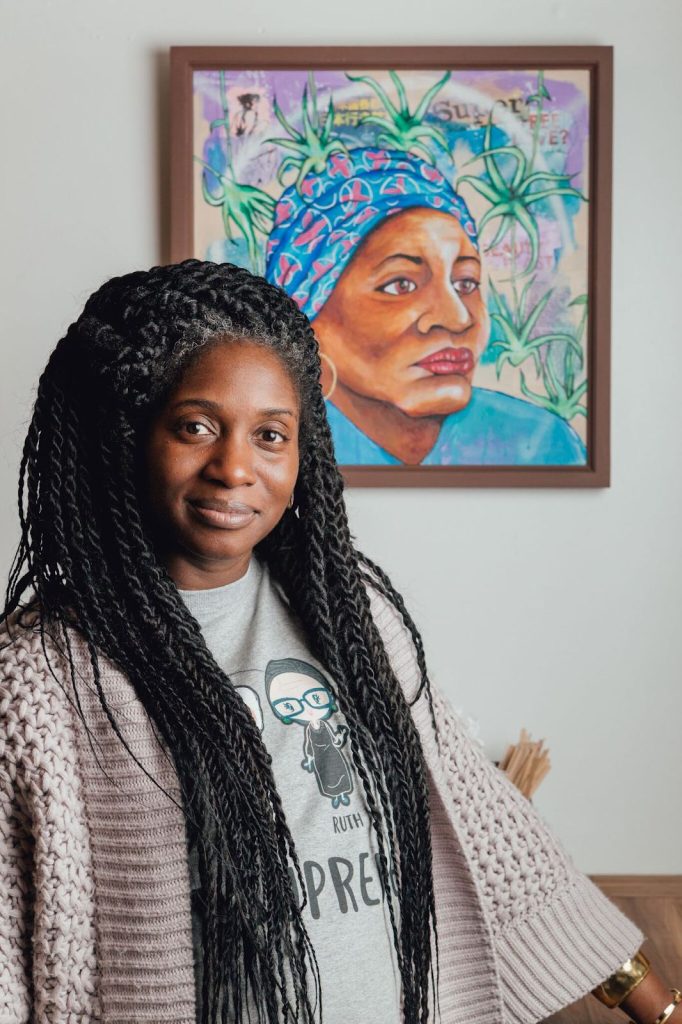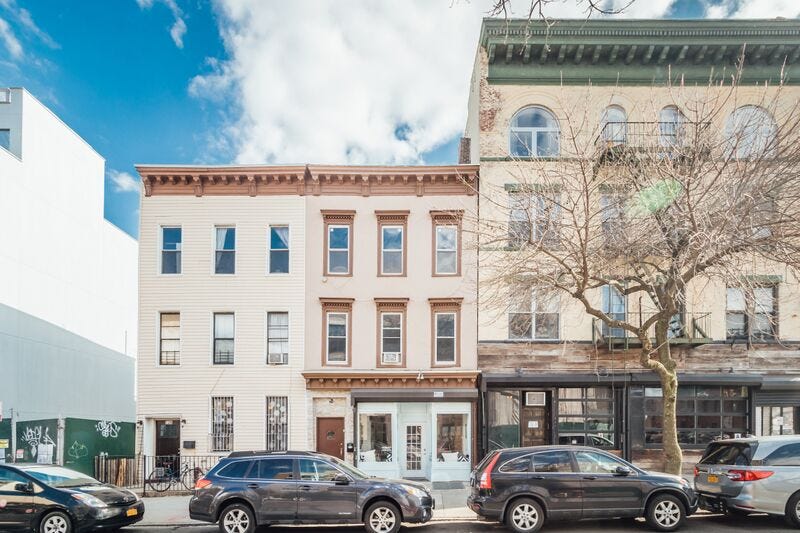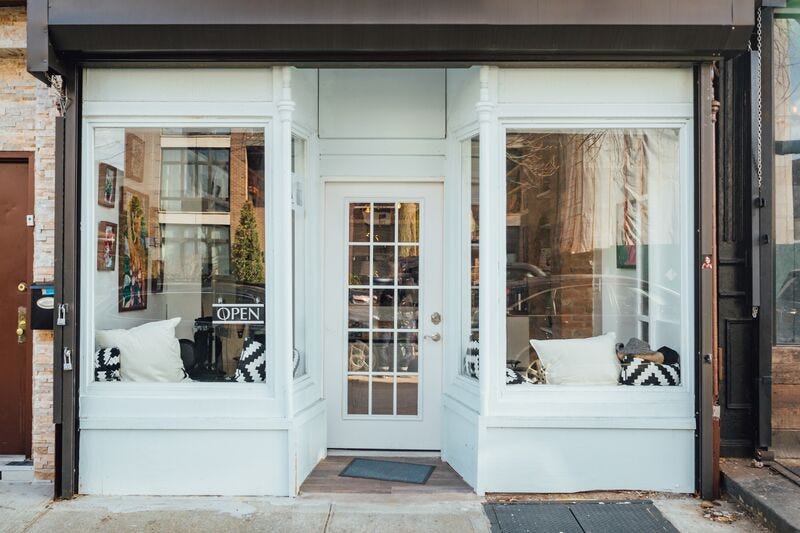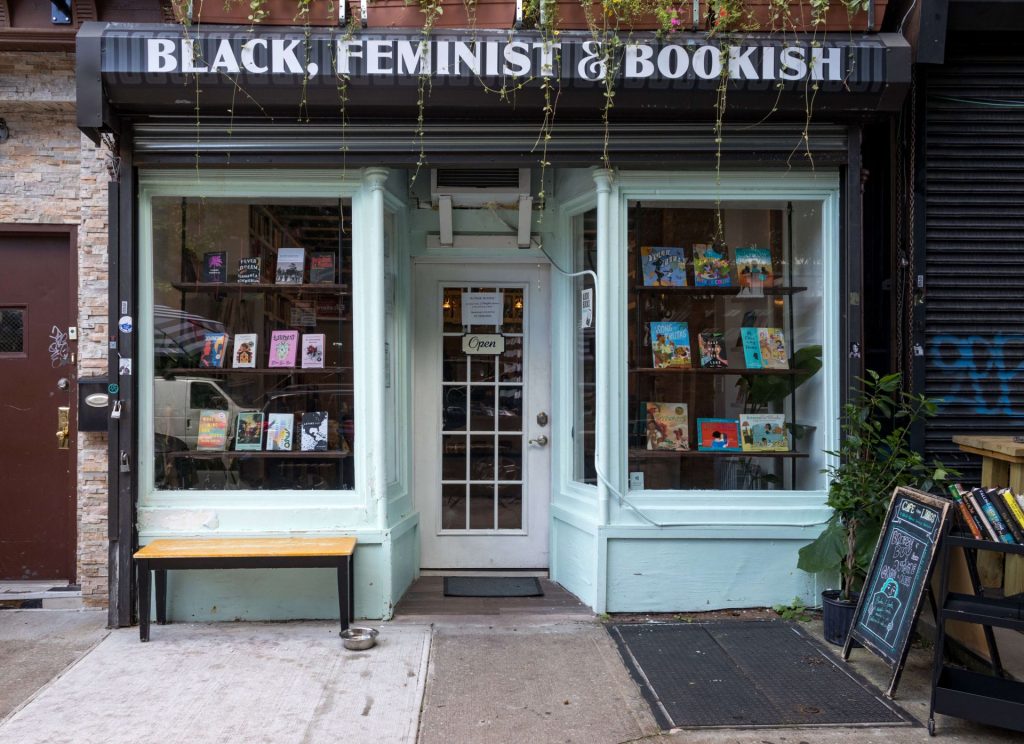Café con Libros: How One Woman’s Life and Neighborhood Inspired the Impactful Brooklyn Bookstore.
The heartbeat of Brooklyn’s Café con Libros lies with its owner, Kalima DeSuze. Her experience growing up in the neighborhood of Crown Heights, as well as her background in the military and social work inspired her to open her black, latinx, and feminist bookstore that has become a treasured gem of the neighborhood.
DeSuze gained her love of reading from her mother, who introduced her to important works by women of color such as Alice Walker’s The Color Purple, and magazines like Ebony (Rebecca). DeSuze was also lucky enough to live only a short walk from the gorgeous Brooklyn Central Library, giving her easy access to a plethora of books that would forever impact her life.

However, nothing would radicalize and inspire DeSuze more than her six-year service in the United States Military. Even though she was grateful for her time forging community with people she might never have met otherwise, she acknowledges that “‘it’s also very problematic’” (Rebecca). Most of all she was struck with the intense prejudice and oppression that exists in a system with such strong power dynamics.
Left: Kalima DeSuze, owner of Café con Libros.
“‘I saw so much rape, so much abuse of power, and I saw so much of women taking the blame and how women are so often sacrificial. I didn’t have the language, but I was really curious and really emotional that this could happen.’”
Returning from her years of service, DeSuze had a new passion and need to contextualize her experiences. She attended Hunter College in Manhattan, getting a Masters in Social Work (Rebecca). In DeSuze’s words, “Hunter changed my life.” With a new degree and ability to understand some of the things she experienced under her belt, DeSuze built an impressive résumé. Besides her military service, “[s]he’s worked with survivors of domestic violence, created programs for female veterans, and facilitated a men’s trauma group in a prison. She’s served as the Community Development Director at Service Women’s Action Network (SWAN), the primary organizer for the Undoing Racism Project, the chief strategist for three major campaigns at Voices of Women Organizing Project…the list goes on” (Rebecca).
A timeline noting significant dates that influenced the Brooklyn bookstore Café con Libros, including historical events in the neighborhood, events in the life of the owner, and recent political movements the store has gotten involved in.
This well-rounded background brought DeSuze to seriously consider opening a business, and finally in 2017, after intense research and preparation, Café con Libros opened its doors. Even the name is steeped in DeSuze’s family history, as it is a play on café con leche, reflecting her heritage from Panama (Rebecca). Her cultural identity as an Afro-Latinx woman in a neighborhood that has a large black and immigrant population was integral to the beginnings of Café con Libros. She knew that Crown Heights was the only place she could possibly open her store, as her life growing up there had shaped her, and the community was home. She knew that she wanted to open a community-oriented business that would uplift people of color and women, and she wanted it to be a place of joy. The only thing left was deciding what that business would be.
“‘Books really saved my life…I looked around at my books and most of them were written by women, women of color, and they were global. And it really saved my life. There were times when I couldn’t answer questions about my own identity and I would read, and it would give me more insight into who I am and put my experience in a global context; it’s not just about me. So I decided I wanted a feminist bookstore.’”
-Kalima DeSuze
Daphne Spain’s article about feminist bookstores reiterates the concepts that DeSuze states above. Spain cites Kristin Hogan introducing the concept of the “feminist shelf,” which represented “the relationships among race, gender, ethnicity, sexual preference, motherhood, and the myriad other ways in which women define themselves…A variety of texts revealed multidimensional and complex female identities that could transform women’s sense of self.” DeSuze recreates the feminist shelf in her own store, providing a space where women could contextualize their lives through books, like she did. As Spain says, “Women visited feminist bookstores to see themselves in the books.” Even though Spain focuses on early feminist bookstores in the late 20th century, those statements stand true today.
Café con Libros not only carries on the legacy of the early feminist bookstores, but also the black bookstores that were active in political movements. New York City has a rich history of black bookstores, including the first recorded black bookstore, opened in Manhattan by abolitionist David Ruggles (Davis 40). However, like feminist bookstores, the trademark of black bookstores was their political involvement, especially with the Black Power movement. “Successful black bookstores enacted Black Power’s goals for self-determination by bringing together the movement’s campaigns for black politics, black arts, black studies, black community control, and black economic empowerment into the space of a single business” (Davis 38). Café con Libros continues these ideals by becoming a space of community to discuss such topics through their book clubs, providing resources to communities of color and women, and staying involved with political endeavors such as the Black Lives Matter movement in 2020, and Roe v. Wade.
DeSuze was inspired to create Café con Libros to “‘center stories by women, about women, for women, particularly women across the diaspora and women of color who we don’t typically hear from in the mainstream’” (Cafe con Libros). However, in starting the bookstore, DeSuze was forced to grapple with a major issue within the neighborhood: gentrification. “‘A café is the number-one marker of gentrification in most communities of color, and I’ve had to wrestle with that and how people view me…Sometimes people will walk right past because they don’t believe the space is for them, and that is so incredibly painful’” (Cafe con Libros).
Crown Heights experienced massive change following the end of World War II. A neighborhood that was once majority white began to see an increase in “African-Americans from the southern United States and black immigrants from the Caribbean” (Remembering Crown Heights). The 1960s saw the most change; “in 1960 the neighborhood was 70% white, by 1970 it was 70% black” (Remembering Crown Heights). The only caveat to this demographic shift was the population of Lubavitch Hasidic Jews that kept their residence in Crown Heights. Eventually there grew a division between the communities; Crown Heights North was home to the African-American and Caribbean residents, and Crown Heights South was home to the Lubavitch Jews (Remembering Crown Heights). Tensions between the communities culminated in August of 1991, when a car “in the motorcade of the Lubavitcher grand rebbe” veered off the road and killed 7-year-old Gavin Cato and injured his cousin Angela (CBS News). Misinformation spread, tensions rose, and members of the black community retaliated by killing the innocent Jewish student Yankel Rosenbaum. Following this, four days of rioting began, resulting in 150 police officers and 38 civilians being injured (CBS News). It took time to rebuild the community, and memories of the violence still permeates the neighborhood.
Unfortunately, Crown Heights has indeed become gentrified. Between 2000-2010, Crown Heights lost at least 10-14 percent of their black population (Yee). Rent increases have pushed loyal residents out of their beloved neighborhood and into eastern Brooklyn, the southern US, or back to many of their native Caribbean (Yee). DeSuze’s anxieties about her bookstore being a marker of gentrification are not unfounded, as the atmosphere and demographic in Crown Heights has changed significantly since DeSuze was growing up. However, she was determined to bring a community-oriented business focused on black and feminist stories to this neighborhood, leading to the Café con Libros that exists today.



On the left is a street view of the building that would become Café con Libros. Center is a close up of the building that would become Café con Libros. Right is Café con Libros as of 2021.
DeSuze’s journey to open her bookstore is an admirable one. Her experience growing up in Crown Heights was integral to her passion for books and a business that carried on the legacy of the influential feminist and black bookstores of the past. Crown Height’s has a such a rich, deep history, even with the strain of the 1991 riots and gentrification, that I agree with DeSuze when she said that this was the only place she could have possibly imagined opening such a store. Even though the store is successful, she experienced the economic struggle that all independent bookstores go through, and nearly closed in 2019 (DeSuze). However, the support of her community in Crown Heights, and her determination that she was doing valuable work, allowed her to stay open. Her life experience, varied as it was, makes Café con Libros what it is, and without the things that she lived through, the bookstore would not exist.
Works Cited
“Cafe con Libros.” Black Owned Brooklyn. 1 March, 2018. https://www.blackownedbrooklyn.com/stories/cafe-con-libros. Accessed 7 October, 2023.
“Crown Heights from the 1950s to today.” Remembering Crown Heights. https://wp.nyu.edu/crownheights/history-and-geography/crown-heights-from-the-1950s-to-today/. Accessed 7 October, 2023.
“Crown Heights, 30 Years Later: Looking Back On The Riot That Tore The City Apart,” CBS News. 21 August, 2021. https://www.cbsnews.com/newyork/news/crown-heights-riots-30-years-later/. Accessed 7 October, 2023.
Davis, Joshua Clark. “Liberation Through Literacy.” From Head Shops to Whole Foods: The Rise and Fall of Activist Entrepreneurs. Columbia University Press, February 2020.
DeSuze, Kalima. “Support Black Businesses.” Cafe con Libros. 27 September, 2019. https://www.cafeconlibrosbk.com/post/support-black-businesses. Accessed 7 October, 2023.
Rebecca. “Badass Women: Kalima DeSuze, founder of feminist bookstore, Cafe con Libros.” Medium. 28 June, 2018. https://medium.com/coconuts/badass-women-kalima-desuze-founder-of-feminist-bookstore-cafe-con-libros-c64e0f8ed358. Accessed 7 October, 2023.
Spain, Daphne. “Feminist Bookstores: Building Identity.” Constructive Feminism. Cornell University Press, 2016.
Yee, Vivian. “Gentrification in a Brooklyn Neighborhood Forces Residents to Move On.” New York Times. 27 November, 2015. https://www.nytimes.com/2015/11/29/nyregion/gentrification-in-a-brooklyn-neighborhood-forces-residents-to-move-on.html. Access 7 October, 2023.
Images and Video
DeVries, Susan. “Cafe con Libros Serves Up Coffee and Community in Crown Heights.” Brownstoner.com. 19 November, 2021. https://www.brownstoner.com/brooklyn-life/crown-heights-bookstore-cafe-con-libros-724-prospect-place-feminist-bookclub-kalima-desuze/. Accessed 7 October, 2023.
Setter, Chris. “Badass Women: Kalima DeSuze, founder of feminist bookstore, Cafe con Libros.” Medium.com. 28 June, 2018. https://medium.com/coconuts/badass-women-kalima-desuze-founder-of-feminist-bookstore-cafe-con-libros-c64e0f8ed358. Accessed 7 October, 2023.
“Crown Heights, 30 Years Later: Looking Back On The Riot That Tore The City Apart,” Cbsnews.com. 21 August, 2021. https://www.cbsnews.com/newyork/news/crown-heights-riots-30-years-later/. Accessed 7 October, 2023.
Timeline
Timeline created by Janelle Cass using https://time.graphics

0 Comments